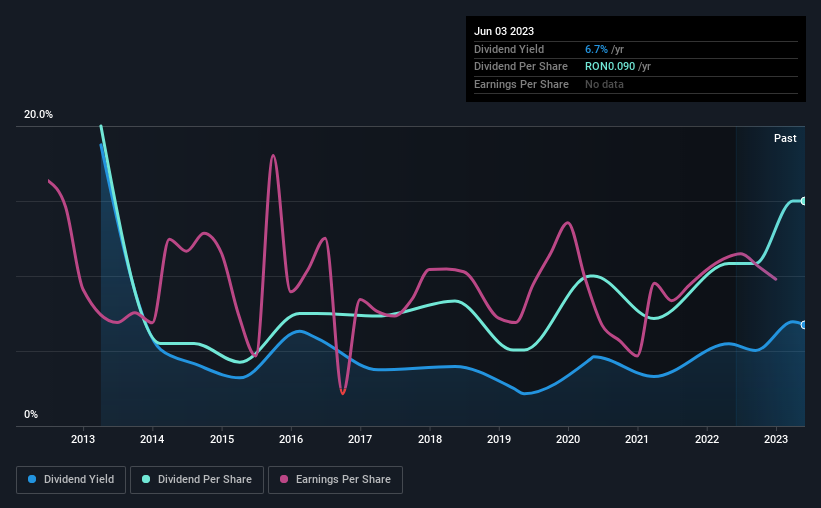- Romania
- /
- Capital Markets
- /
- BVB:EVER
Why It Might Not Make Sense To Buy Evergent Investments S.A. (BVB:EVER) For Its Upcoming Dividend

It looks like Evergent Investments S.A. (BVB:EVER) is about to go ex-dividend in the next three days. The ex-dividend date is one business day before the record date, which is the cut-off date for shareholders to be present on the company's books to be eligible for a dividend payment. The ex-dividend date is important because any transaction on a stock needs to have been settled before the record date in order to be eligible for a dividend. Accordingly, Evergent Investments investors that purchase the stock on or after the 8th of June will not receive the dividend, which will be paid on the 28th of June.
The company's next dividend payment will be RON0.09 per share. Last year, in total, the company distributed RON0.09 to shareholders. Looking at the last 12 months of distributions, Evergent Investments has a trailing yield of approximately 6.7% on its current stock price of RON1.335. We love seeing companies pay a dividend, but it's also important to be sure that laying the golden eggs isn't going to kill our golden goose! So we need to check whether the dividend payments are covered, and if earnings are growing.
See our latest analysis for Evergent Investments
If a company pays out more in dividends than it earned, then the dividend might become unsustainable - hardly an ideal situation. Evergent Investments paid out more than half (62%) of its earnings last year, which is a regular payout ratio for most companies.
Companies that pay out less in dividends than they earn in profits generally have more sustainable dividends. The lower the payout ratio, the more wiggle room the business has before it could be forced to cut the dividend.
Click here to see how much of its profit Evergent Investments paid out over the last 12 months.

Have Earnings And Dividends Been Growing?
Companies that aren't growing their earnings can still be valuable, but it is even more important to assess the sustainability of the dividend if it looks like the company will struggle to grow. If earnings decline and the company is forced to cut its dividend, investors could watch the value of their investment go up in smoke. With that in mind, we're not enthused to see that Evergent Investments's earnings per share have remained effectively flat over the past five years. Better than seeing them fall off a cliff, for sure, but the best dividend stocks grow their earnings meaningfully over the long run.
Many investors will assess a company's dividend performance by evaluating how much the dividend payments have changed over time. Evergent Investments has seen its dividend decline 2.8% per annum on average over the past 10 years, which is not great to see.
Final Takeaway
Has Evergent Investments got what it takes to maintain its dividend payments? Earnings per share have not grown at all, and the company pays out a bit over half its profits to shareholders. This is not an overtly appealing combination of characteristics, and we're just not that interested in this company's dividend.
So if you're still interested in Evergent Investments despite it's poor dividend qualities, you should be well informed on some of the risks facing this stock. To that end, you should learn about the 3 warning signs we've spotted with Evergent Investments (including 1 which is a bit unpleasant).
If you're in the market for strong dividend payers, we recommend checking our selection of top dividend stocks.
Valuation is complex, but we're here to simplify it.
Discover if Evergent Investments might be undervalued or overvalued with our detailed analysis, featuring fair value estimates, potential risks, dividends, insider trades, and its financial condition.
Access Free AnalysisHave feedback on this article? Concerned about the content? Get in touch with us directly. Alternatively, email editorial-team (at) simplywallst.com.
This article by Simply Wall St is general in nature. We provide commentary based on historical data and analyst forecasts only using an unbiased methodology and our articles are not intended to be financial advice. It does not constitute a recommendation to buy or sell any stock, and does not take account of your objectives, or your financial situation. We aim to bring you long-term focused analysis driven by fundamental data. Note that our analysis may not factor in the latest price-sensitive company announcements or qualitative material. Simply Wall St has no position in any stocks mentioned.
About BVB:EVER
Solid track record with adequate balance sheet and pays a dividend.
Market Insights
Community Narratives



